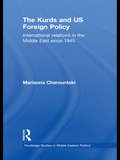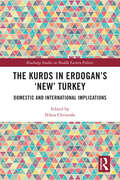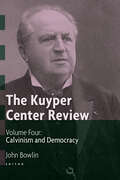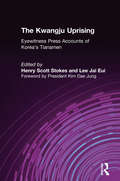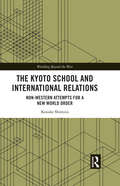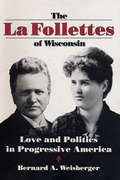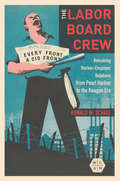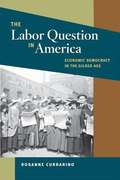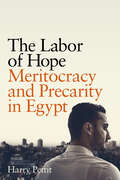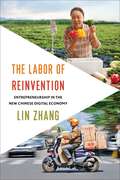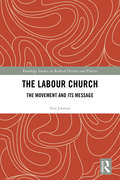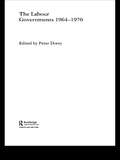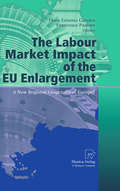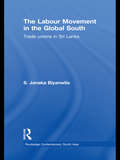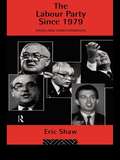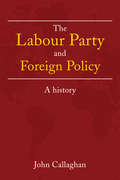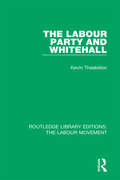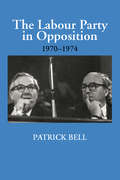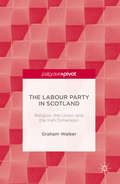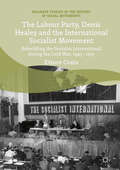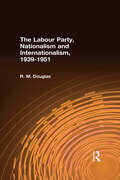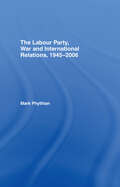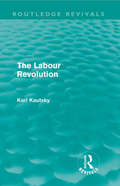- Table View
- List View
The Kurds and US Foreign Policy: International Relations in the Middle East since 1945 (Routledge Studies in Middle Eastern Politics)
by Marianna CharountakiThis book provides a detailed survey and analysis of US–Kurdish relations and their interaction with domestic, regional and global politics. Using the Kurdish issue to explore the nature of the engagement between international powers and weaker non-state entities, the author analyses the existence of an interactive US relationship with the Kurds of Iraq. Drawing on governmental archives and interviews with political figures both in Northern Iraq and the United States, the author places the case study within a broader International Relations context. The conceptual framework centres on the inter-relations between actors (both state and non-state) and structures of material and ideational kinds, while the detailed survey and analysis of US–Kurdish relations, in their interaction with domestic, regional and global politics, forms the empirical core of the study. Stressing the intertwining of domestic and foreign policy as part of the same set of dynamics, the case study explains the emergence of the interactive and institutionalized US relationship with the Kurds of Iraq that has brought about the formation, within an Iraqi framework, of an undeclared US official Kurdish policy in the post-Saddam era. Filling a gap in the literature on US–Kurdish relations as well as the broader topic of International Relations, this book will be of great interest to those in the areas of International Relations, Middle Eastern and Kurdish Politics.
The Kurds in Erdogan's "New" Turkey: Domestic and International Implications (Routledge Studies in Middle Eastern Politics)
by Nikos ChristofisThis book focuses on the AKP government since 2002 during which time the state’s approach to the Kurdish Question has undergone several changes. Examining what preceded and followed the failed putsch of 2016, it explains and critiques that situates the Kurdish Question in its broader context. It stands out with the main objective to avoid any ‘policy-oriented bias’ through an interdisciplinary and multi-thematic approach. The volume discusses the state and policies in the Kurdish region of Turkey, as well as counter-hegemonic discourses that seek to reform existing institutions. Some chapters focus on the domestic aspects and gender perspectives of the Kurdish Question in Turkey, which focus has been taken over by recent developments in Syria and the Middle East in general. Other chapters include a range of new aspects of Turkish society and politics, and the international aspects of Ankara’s policies and its implications not only inside Turkey but also internationally. Taking both domestic and foreign policy aspects into account, the book offers a set of innovative explanations for the state of crisis in Turkey and a solid basis for thinking about the likely path forward. Scholars, researchers and post-graduates, interested in political theory, Kurdish and Middle East politics will find this book invaluable.
The Kuyper Center Review, volume 4: Calvinism and Democracy
by John BowlinExplores the influence of Calvinism on democratic theory and practice Abraham Kuyper (1837-1920) -- pastor, theologian, journalist, and politician -- is highly regarded as exemplifying how a Christian worldview can be confidently expressed in both theory and practice. Honoring the spirit of Kuyper's legacy, The Kuyper Center Review annually publishes substantial essays that relate the tradition of Reformed theology to issues of public life. Kuyper was a principal force, both political and intellectual, behind the democratization of politics and public life that occurred in the Netherlands at the close of the nineteenth century. This volume reflects on that legacy, not only examining its theological roots and historical context but also assessing democracy's prospects in our own day and considering the ways in which Reformed theology might provide resources for democratic criticism and renewal.Contributors: Clifford B. Anderson Michael Brautigam Clay Cooke Michael DeMoor James Eglinton George Harinck Brant Himes David Little Jeffrey Stout Harry Van Dyke
The Kwangju Uprising: A Miracle of Asian Democracy as Seen by the Western and the Korean Press (A\pacific Basin Institute Book Ser.)
by Lily Xiao Lee Henry Scott StokesThe Kwangju Uprising that occurred in May 1980 is burned into the minds of South Koreans in much the same way that Tiananmen is burned into the minds of contemporary Chinese. As the world watched in horror following the assassination of President Park Chung Hee, student protesters were brutally suppressed by the military and police led by strongman Chun Doo Hwan. Kim Dae Jung, the current president of South Korea, was imprisoned and sentenced to death during this period.This book recreates those earth-shaking events through eyewitness reports of leading Western correspondents on the scene as well as Korean participants and observers. Photographs, detailed street maps, and dramatic woodblock prints further illuminate the day-to-day drama to keep this atrocity alive in the conscience of the world.
The Kyoto School and International Relations: Non-Western Attempts for a New World Order (Worlding Beyond the West)
by Kosuke ShimizuThe Kyoto School and International Relations explores the Kyoto School’s challenge to transcend the ‘Western’ domination over the ‘rest’ of the world, and the issues this raises for contemporary ‘non-Western’ and ‘Global IR’ literature. Was the support of Kyoto School thinkers inevitable due to the despotism of military government, thus nothing to do with their philosophy, or a logical extension of their philosophical engagement? The book answers this question by investigating individual Kyoto School philosophers in detail. The author argues that any attempts to transcend the ‘West’ are destined to be drawn into power politics as far as they uncritically adopt and use the prevailing ontological concept of linear progressive time and dominant meta-narrative of Westphalia. Thus, to fully understand this problem, there is the need to be cautious of the power of language of Westphalia and the concept of time in IR. Aimed at students and scholars of IR theory, Japanese politics and East Asian IR in general, this book provides some introductory explanations of these academic subjects, developing a theory based on the concepts of time and language of Kyoto School philosophy.
The L Word: An Unapologetic, Thoroughly Biased, Long-Overdue Explication and Celebration of Liberalism
by David P. BarashDiscussion of liberalism
The La Follettes of Wisconsin
by Bernard A. WeisbergerThe La Follettes of Wisconsin--Robert, Belle, and their children, Bob Jr. , Phil, Fola, and Mary--are vividly brought to life in this collective biography of an American political family. As governor of Wisconsin (1901-06) and U. S. Senator (1906-25), "Fighting Bob" battled relentlessly for his Progressive vision of democracy--an idealistic mixture of informed citizenry and enlightened egalitarianism. By contrast, the private man suffered from intense, isolated periods of depression and relied heavily on his family for survival. Together, "Old Bob" and his beloved wife, Belle Case La Follette--a lawyer, journalist, and Progressive leader in her own right--raised their children in the distinctly uncompromising La Follette tradition of challenging social and political ills. Fola became a campaigner for women's suffrage, Phil was governor of Wisconsin, and "Young Bob" became a U. S. senator.
The Labor Board Crew: Remaking Worker-Employer Relations from Pearl Harbor to the Reagan Era (Working Class in American History #314)
by Ronald W. SchatzRonald Schatz tells the story of the team of young economists and lawyers whom George W. Taylor recruited to the National War Labor Board to resolve union-management conflicts during the Second World War. The crew (including Clark Kerr, John Dunlop, Jean McKelvey, and Marvin Miller) exerted broad influence on the U.S. economy and society for the next forty years. They handled thousands of grievances and strikes. They founded academic industrial relations programs. When the 1960s student movement erupted, universities appointed them as top administrators charged with quelling the conflicts. In the 1970s, they developed systems that advanced public sector unionization and revolutionized employment conditions in Major League Baseball. Schatz argues that the Labor Board vets, who saw themselves as disinterested technocrats, were in truth utopian reformers aiming to transform the world. Beginning in the 1970s stagflation era, they faced unforeseen opposition, and the cooperative relationships they had fostered withered. Yet their protégé George Shultz used mediation techniques learned from his mentors to assist in the integration of Southern public schools, institute affirmative action in industry, and conduct Cold War negotiations with Mikhail Gorbachev.
The Labor Question in America: Economic Democracy in the Gilded Age (The Working Class in American History)
by Rosanne CurrarinoIn The Labor Question in America: Economic Democracy in the Gilded Age, Rosanne Currarino traces the struggle to define the nature of democratic life in an era of industrial strife. As Americans confronted the glaring disparity between democracy's promises of independence and prosperity and the grim realities of economic want and wage labor, they asked, "What should constitute full participation in American society? What standard of living should citizens expect and demand?" Currarino traces the diverse efforts to answer to these questions, from the fledgling trade union movement to contests over immigration, from economic theory to popular literature, from legal debates to social reform. The contradictory answers that emerged--one stressing economic participation in a consumer society, the other emphasizing property ownership and self-reliance--remain pressing today as contemporary scholars, journalists, and social critics grapple with the meaning of democracy in post-industrial America.
The Labor of Hope: Meritocracy and Precarity in Egypt
by Harry PettitTechnological advancements, expanding education, and unfettered capitalism have encouraged many around the world to aspire to better lives, even as declines in employment and widening inequality are pushing more and more people into insecurity and hardship. In Egypt, a generation of young men desire fulfilling employment, meaningful relationships, and secure family life, yet find few paths to achieve this. The Labor of Hope follows these educated but underemployed men as they struggle to establish careers and build satisfying lives. In so doing, this book reveals the lived contradiction at the heart of capitalist systems—the expansive dreams they encourage and the precarious lives they produce. Harry Pettit follows young men as they engage a booming training, recruitment, and entrepreneurship industry that sells the cruel meritocratic promise that a good life is realizable for all. He considers the various ways individuals cultivate distraction and hope for future mobility: education, migration, consumption, and prayer. These hope-filled practices are a form of emotional labor for young men, placing responsibility on the individual rather than structural issues in Egypt's economy. Illuminating this emotional labor, Pettit shows how the capitalist economy continues to capture the attention of the very people harmed by it.
The Labor of Reinvention: Entrepreneurship in the New Chinese Digital Economy
by Lin ZhangFrom start-up founders in the Chinese equivalent of Silicon Valley to rural villages experiencing an e-commerce boom to middle-class women reselling luxury goods, the rise of internet-based entrepreneurship has affected every part of China. For many, reinventing oneself as an entrepreneur has appeared to be an appealing way to adapt to a changing economy and society. Yet in practice, digital entrepreneurship has also reinforced traditional Chinese ideas about state power, labor, gender, and identity.Lin Zhang explores how the everyday labor of entrepreneurial reinvention is remaking China amid changing geopolitical currents. She tells the stories of people from diverse class, gender, and age backgrounds across rural, urban, and transnational settings in rich detail, providing a multifaceted and ground-level view of the twenty-first-century Chinese economy. Zhang explores the surge in digital entrepreneurialism against the backdrop of global financial crises, the U.S.-China trade war, and the COVID-19 pandemic. She argues that the rise of internet-based industries and practices has simultaneously empowered and exploited digital entrepreneurs and laborers. Despite embracing high-tech innovation, state-led entrepreneurialization does not represent a radical break with the past. It has provided a means for implementing developmental goals while retaining the importance of the traditional family and generating new inequalities.Shedding new light on global capitalism and the digital economy by centering a non-Western perspective, The Labor of Reinvention vividly conveys how the contradictions of entrepreneurialism have played out in China.
The Labour Church: The Movement & Its Message (Routledge Studies in Radical History and Politics)
by Neil JohnsonThis book aims to unpack the core message of the Labour Church and question the accepted views of the movement by pursuing an alternative way of analysing its history, significance and meaning. The religious influences on late-nineteenth/early-twentieth-century British Socialism are examined and placed within a wider context, highlighting a continuing theological imperative for the British Labour movement. The book argues that the most distinctive feature of the Labour Church was Theological Socialism. For its founder, John Trevor, Theological Socialism was the literal Religion of Socialism, a post-Christian prophecy announcing the dawn of a new utopian era explained in terms of the Kingdom of God on earth; for members of the Labour Church, who are referred to as Theological Socialists, Theological Socialism was an inclusive message about God working through the Labour movement. Challenging the historiography and reappraising the political significance of the Labour Church, this book will be of interest to students and scholars researching the intersection between religion and politics, as well as radical left history and politics more generally.
The Labour Governments 1964-1970 (British Politics and Society)
by Peter DoreyPeter Dorey here presents the most comprehensive, in-depth and original book of the 1964-1970 labour governments published to date. This unique account examines a wide range of political issues and makes extensive use of primary sources recently released by the Public Records Office, including previously unpublished cabinet papers, ministerial correspondence, ministers' private papers and interviews with former ministers. Peter Dorey analyzes the policies and intra-party debates of the era and the problems which ministers faced in the context of both external events, and the growing unrest amongst labour backbenchers. Providing a systematic analysis of this key period in modern British history, contributions span economic policies, foreign affairs, social reform, liberalism, constitutional reform and territorial management, thus ensuring that this text is essential reading for researchers and students of politics and government.
The Labour Market Impact of the EU Enlargement
by Francesco Pastore Floro Ernesto CaroleoUntil recently, regional labour market imbalances were considered transitory phenomena caused by state failure in yielding distorted investment incentives and by labour market rigidities. Labour mobility and wage flexibility were at the core of the debate over the causes of and cures for regional imbalances. This book bears witness to the changed perspective of research. For instance, in the recent literature, internal migration is depicted as a cause of further geographical divergence. The book contributes to the debate by presenting important new findings on: a) the reasons why structural change in some sectors causes a slump in some regions; b) the extent to which poverty traps explain spatial imbalances; c) the degree of convergence across EU countries and regions; d) the role of labour mobility in Central and Eastern Europe; e) and the role of pro-active employment schemes and child care facilities in alleviating the hardship of the weakest segments of the population.
The Labour Movement in the Global South: Trade Unions in Sri Lanka (Routledge Contemporary South Asia Series)
by S. Janaka BiyanwilaBased on extensive original research, this book examines the challenges confronting trade unions in the global South, by focusing on trade union struggles in Sri Lanka under neo-liberal globalisation. It centres on movement politics of unions; explains union capacities to mobilise workers as a part of broad counter movement; and specifies worker struggles in Sri Lanka. The author identifies key dimensions of variation in the approaches taken by oppositional groupings, in particular unions, other labour organisations and the labour movement, and locates those variations in a larger theoretical context. Three case studies on trade unions in tea plantations, garment factories and among the nurses show how these theoretical dimensions operate in practice, and the consequences for the sort of opposition that is (and is not) created. The book contributes to the on-going debate on social movement unionism, and it also reveals their gaps in terms of addressing how class injustices are mediated through ethno-nationalist projects reproducing ethnic and gender hierarchies. It acknowledges the diversity of experiences and forms of resistance in the global South and critically engages with issues of gender, ethnicity and labour internationalism, providing a useful contribution to studies on South Asian Politics as well as Labour and Development Studies.
The Labour Party Since 1979: Crisis and Transformation
by Eric u ShawThe Labour Party since 1979: Crisis and Transformation challenges the claim that Labour's only real hope for the future lies in shedding its ideological baggage. It rejects the notion taht the 'shadow budget' was the prime cause of its 1992 defeat and argues that the strategyof seeking an image of 'responsibility' and 'respectability' - which under the new leadership has become a paramount concern - does not offer the best route forward for the party.The effect of this strategy - of abandoning traditional tenets, and adopting a policy profile more to the tastes of its critics in business and the media - will be to deprive Labour of its sheet-anchor; and even if successful electorally, the price will be that the hopes and aspirations of its supporters will be highly unlikely to be fulfilled.
The Labour Party and Foreign Policy: A History
by John CallaghanThis book provides a penetrating new study of the Labour Party’s thinking on international relations, which probes the past, present and future of the party’s approach to the international stage. The foreign policy of the Labour Party is not only neglected in most histories of the party, it is also often considered in isolation from the party’s origins, evolution and major domestic preoccupations. Yet nothing has been more divisive and more controversial in Labour’s history than the party’s foreign and defence policies and their relationship to its domestic programme. Much more has turned on this than the generation of tempestuous conference debates. Labour’s credentials as a credible prospect for Governmental office were thought to depend on a responsible approach to foreign and defence policy. Its exclusion from office was often said to stem from a failure to meet this test, as in the 1950s. The composition of Labour Cabinets was powerfully influenced by foreign and defence considerations, as was the centralization of power and decision-making within Labour Governments. The domestic achievements and failures of these periods in office were inextricably connected to international questions. The Labour Party and Foreign Policy is recommended for undergraduate and postgraduate courses in British politics and European history.
The Labour Party and Whitehall (Routledge Library Editions: The Labour Movement #38)
by Kevin TheakstonFirst published in 1992. In this lively and controversial book, Kevin Theakston examines the Yes, Minister-style argument popularised by Tony Benn and Richard Crossman that the civil service obstructs Labour government policies. He argues that in fact the Labour party’s problems and failures in office are largely political in origin. The book surveys the development of socialist thinking about Whitehall, and examines the claim of a Labour MP in 1979 that ‘It is as if Labour in office has now lost all stomach for administrative reform.’ Theakston looks at the effectiveness of Labour’s various reform schemes, raising important issues such as politicisation and power in the civil service, Whitehall management, elitism in civil service recruitment, and secrecy and ‘open government’. This book will appeal to researchers and students of British politics, public administration, and history, as well as to all those with an interest in Whitehall reform, or in Labour Party politics.
The Labour Party in Opposition 1970-1974 (British Politics and Society)
by Patrick Bell1970 to 1974 was a pivotal period in the history of the Labour Party. This book shows how the Labour Party responded to electoral defeat in 1970 and to what extent its political and policy activity in opposition was directed to the recovery of power at the following general election. At a point in Labour's history when social democracy had apparently failed, this book considers what the party came up with in its place. The story of the Labour Party in opposition, 1970-1974, is shown to be one of a major political party sustaining policy activity of limited relevance to its electoral requirements. Not only that, but Labour regained office in 1974 with policies on wages and industrial relations whose unworkability led to the failure of the Labour government 1974-1979, and the Labour Party's irrelevance to so many voters after 1979. Using primary sources, the author documents and explains how this happened, focusing on the party's response to defeat in 1970 and the behaviour of key individuals in the parliamentary leadership in response to pressure for a review of policy.
The Labour Party in Scotland
by Graham WalkerThis book makes a timely contribution to our understanding of thedramatic political changes that have recently affected Scotland and thrown intodoubt the country's future position within the United Kingdom. Its focusis on the Labour Party and the loss of its traditional electoral support base. This theme is related to religion and its relevance to Scotland's identitypolitics. The author examines how Labour was able to appeal across theethno-religious divide in Scotland for many decades, before considering theimpact of the new political context of devolution in the 21stcentury and the greater scrutiny given to the question of sectarianism inScottish life. Walker demonstrates the role played by the sectarianismcontroversy in Labour's loss of political control and its eclipse by theScottish National Party (SNP). This book is also the first to assess thesignificance of the Irish dimension in Scotland's political development, inparticular the impact of the conflict in nearby Northern Ireland. It will appeal to students and scholars of Scottish and Irish politics,political science and political/electoral history, as well as the interested wider reader.
The Labour Party in Scotland: Religion, the Union, and the Irish Dimension
by Graham WalkerThis book makes a timely contribution to our understanding of the dramatic political changes that have recently affected Scotland and thrown into doubt the country’s future position within the United Kingdom. Its focus is on the Labour Party and the loss of its traditional electoral support base. This theme is related to religion and its relevance to Scotland’s identity politics. The author examines how Labour was able to appeal across the ethno-religious divide in Scotland for many decades, before considering the impact of the new political context of devolution in the 21st century and the greater scrutiny given to the question of sectarianism in Scottish life. Walker demonstrates the role played by the sectarianism controversy in Labour’s loss of political control and its eclipse by the Scottish National Party (SNP). This book is also the first to assess the significance of the Irish dimension in Scotland’s political development, in particular the impact of the conflict in nearby Northern Ireland. It will appeal to students and scholars of Scottish and Irish politics, political science and political/electoral history, as well as the interested wider reader.
The Labour Party, Denis Healey and the International Socialist Movement: Rebuilding The Socialist International During The Cold War, 1945-1951 (Palgrave Studies in the History of Social Movements)
by Ettore CostaThis book describes how, after the Second World War, the Labour Party assumed leadership of the International Socialist Movement, thanks to the achievements of the Attlee Government. International Secretary Denis Healey guided the reconstruction of the Socialist International through the early Cold War, making the British vision for socialist internationalism prevail over the French and Belgian. At first, the provisional Socialist International (International Socialist Conference and Comisco) supported cohabitation with pro-communist socialists and the USSR, but with the Sovietisation of Eastern Europe it committed to militant anti-communism. Ambiguity between the Labour Party and Labour Government influenced British policy in Austria, Czechoslovakia, Greece, Italy and Poland, while the characterization and stereotypes of Eastern and Southern Europe shaped the language and actions of the British. Furthermore, the book shows how international contacts and the British and Swedish model encouraged the transition of socialist parties to responsible government parties fully embracing Western democracy and prepared the ideological revision of the 1950s.
The Labour Party, Nationalism and Internationalism, 1939-1951
by R. M. DouglasThe Second World War was a watershed moment in foreign policy for the Labour Party in Britain. This book traces how the British democratic left set about the task of defining the principles of a radically new international system for the post-war world. The author shows how the experience of total war fundamentally reshaped the left's attitudes toward national identity and international policy.Breaking with the traditional accounts that place Cold War tensions at the centre of the Attlee government's activities in the immediate postwar years, R. M. Douglas's book provides an entirely new framework for reassessing British foreign policy and left-wing concepts of national identity during the most turbulent mement of Britain's modern history.
The Labour Party, War and International Relations, 1945-2006
by Mark PhythianQuestions of war were not central to the founding of the Labour Party, yet questions of war – specifically, under what circumstances the party would support the dispatch of British military forces to fight abroad – have divided and damaged the party throughout its history more deeply than any other single issue. The Labour Party, War and International Relations, 1945-2006 opens by identifying and examining the factors that have influenced the party’s thinking about war, before considering the post-1945 Cold War context and analyzing a range of cases: the Korean War the party’s response to the 1956 Suez crisis the Wilson government’s approach to the Vietnam War Labour’s response to the 1982 invasion of the Falkland Islands the crisis over the August 1990 Iraqi invasion of Kuwait, culminating in the 1991 war the wars of the 1990s over Bosnia and Kosovo the case for war in Iraq developed by the Blair government during 2002-03. This is a timely book that both illuminates approaches to past wars and helps us understand the basis of current military commitments. As such it will be of great interest to students across courses in politics, history, and war studies.
The Labour Revolution (Routledge Revivals)
by Karl KautskyFirst published in English in 1924 this ambitious work, by the famous Marxist theoretician Karl Kautsky, aims to provide nothing less than an "exposition of the methods to introduce socialism" amongst the capitalist economies of Europe in the post-World War One era. Looking back on the experiences of the German socialist movement and looking forwards to the likelihood of a Labour government in Great Britain, he discusses the problems facing a labour revolution in Europe, with particular reference to the role of the middle classes, the transitional period between capitalism and socialism, and the economic impact of a socialist revolution.
